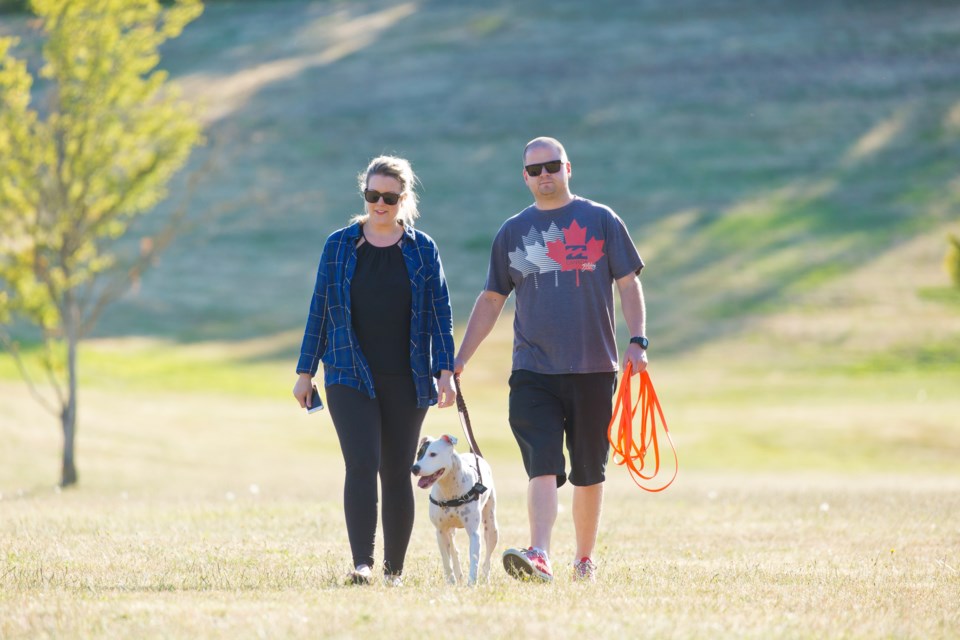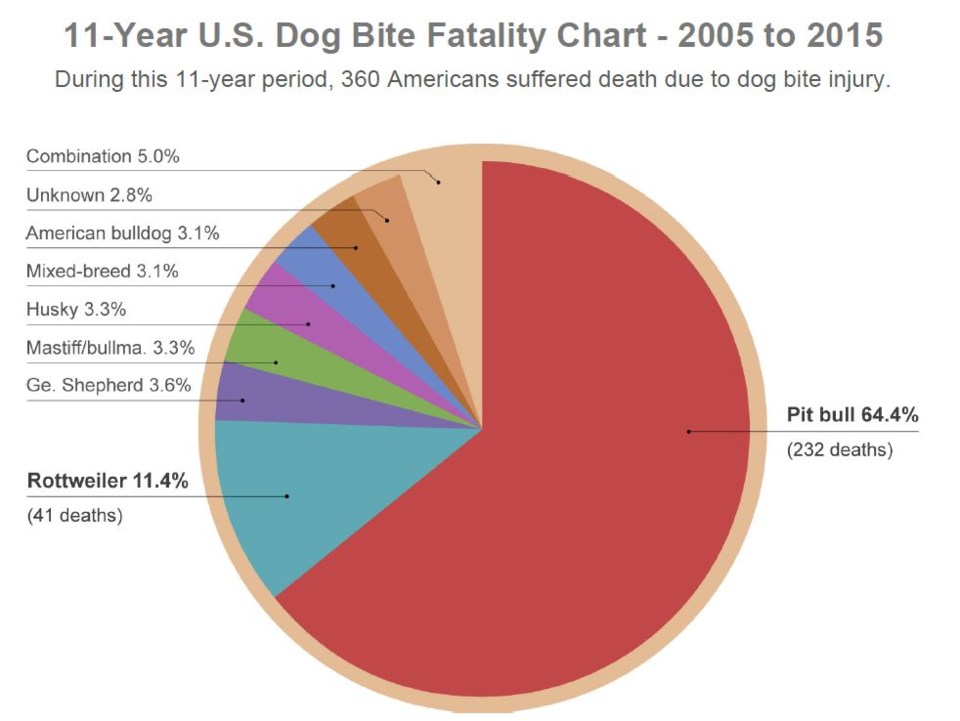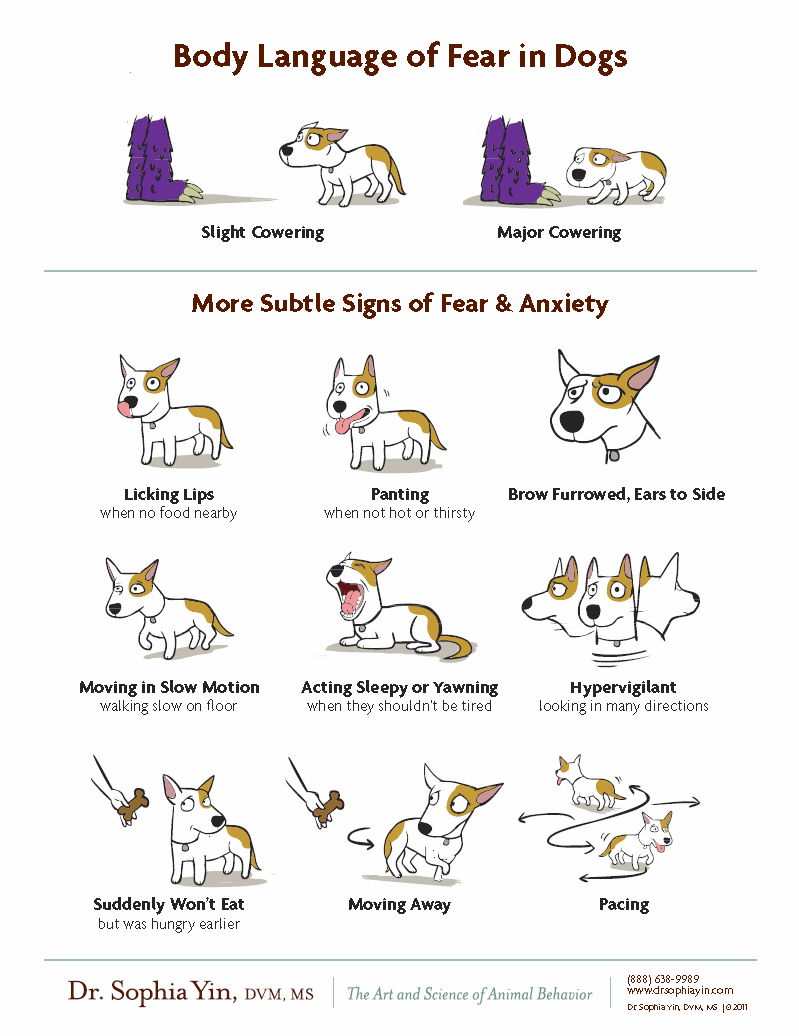Two Rottweilers run wild around a neighbourhood, biting a construction worker in the process, thus leading to a drawn out legal battle with the City of Richmond. A pit bull-cross spooks police officers during an investigation, causing one to shoot at it. A Rottweiler-cross mauls a young woman and a senior man. A German Shepherd gets loose and lacerates a mailman’s leg. A pit bull-terrier attacks a woman at its home, sending her to hospital for facial surgery.
These are just a sample of the hundreds of dog attack investigations Richmond bylaw officers have conducted over the past two years.
To be certain, Richmond is not immune to an increasingly simmering nationwide debate over labeling certain dogs, particularly pit bulls, as “dangerous” and enacting breed specific legislation.
In all of the above cases, save for, perhaps, the latter, the owners were not present at the time of the attack and/or confrontation.
For some, such as the BCSPCA, targeting certain breeds in municipal bylaws to reduce dog attacks has no scientific basis and does not address irresponsible dog owners. Meanwhile, others, such as attack victims, insist blanket legislation against powerful dogs, such as pit bulls and Staffordshire terriers, is necessary, as the risk involved with such animals is too great to leave it to human masters to handle on their own.
Richmond falls into a minority group of municipalities and districts in B.C. that specifically targets pit bulls and terriers. According to its bylaws, from birth, any such dog is labeled “dangerous” and required to be leashed and wear a muzzle at all times in public. However, Richmond also falls short of a more comprehensive set of regulations and punitive fines targeting owners of aggressive or dangerous dogs, regardless of breed — such as in New Westminster.
In the middle of this firestorm debate in Richmond has been Leanne Bird, 33, the owner of Peanut, a mixed-breed pit bull. She contends bylaws aimed at specific breeds are ineffective and fail to focus on responsible dog ownership and animal behaviour education. Her arguments are backed up by numerous studies, as well as the BCSPCA.
And yet, Richmond muzzles pit bulls and terriers, which is fine by people, such as those at National Pit Bull Victim Awareness, who note pit bull attacks are the most damaging of all.
The debate is muddied by the fact in B.C. municipalities are left to regulate dogs as they see fit creating local legislation akin to a jigsaw puzzle. Furthermore, there is no national data concerning dog bites. Additionally, provinces vary on how they address aggressive dogs. And, in B.C., owners of dangerous dogs are not liable for their dog’s actions — an issue that may soon be addressed in Victoria.
According to Bird, Richmond’s bylaws have failed to prevent dog bites, from pit bulls or other dogs.

Adding to Bird’s concerns is that her blind dog is automatically labeled, at birth, as “dangerous” by Richmond’s bylaw, as it has characteristics resembling a pit bull or Staffordshire terrier (Richmond goes beyond the definition of a "dangerous dog" as set out by the provincial Community Charter).
Bird, and husband Shawn, adopted Peanut in 2012, just after buying an apartment in Steveston, but soon realized she was blind.
“We loved Steveston and had no intention of leaving,” she said.
But because of Peanut’s resemblance to a pit bull, it meant she had to wear a muzzle when in public.
This meant the dog couldn’t communicate properly or direct herself when walking, as she relied heavily on scent and her whiskers.
“It was coming to a point that this didn’t make sense,” explained Bird, who then directed her efforts to Richmond city council and City of Richmond staff.
Following a year and a half of what the Birds describe as dismissive attitudes by an “old boys” council, the 2001 Cambie secondary grad, turned legal assistant, moved to Tsawwassen recently.
Bird said she feels she was put in the situation merely because she had been responsible by registering Peanut as a dangerous dog under the bylaw. Meanwhile, she suspects others do not because of higher licensing fees for such dogs.
Bird acknowledges the power of pit bulls but contends Richmond doesn’t encourage responsible dog ownership.
“A large dog will always do more damage, it doesn’t matter what the breed is,” said Bird. “But with all these bites happening in Richmond, nothing happens to those dogs unless they do something drastic. Zero happens here. We’ve had small dogs that have bitten multiple people and nothing happens. So the current bylaws in Richmond haven’t saved any of those bites and there’s no enforcement. There are pit bulls running around with no leash. We have bylaws and they only affect responsible owners.
“It’s not based on behaviour, it’s based on what someone thinks Peanut looks like,” added Bird.
Bird said dogs shouldn’t have to wear muzzles automatically. However, she said she would accept, at the very least, a system in place whereby she could have Peanut certified in some manner by going through a training regimen, in order to have the muzzle requirement and dangerous dog status removed. Bird said Nanaimo provides for such an opportunity. Late last year Richmond councilors expressed no interest in doing so.
The Birds also want to see Richmond up its fines for irresponsible dog owners: increase licence enforcement, raise fines for aggressive behaviour, and issue more tickets for off-leash dogs.
“You have to charge these owners with assault. So a dog kills someone; what’s to stop the owner from getting another dog? There are no repercussions for the owner,” said Shawn.
“And there’s none in Richmond,” said Bird.
“All I want from the City of Richmond is to just review its bylaws,” said Bird.
The City of New Westminster recently revamped its animal control bylaws, which do not target specific breeds. Instead, New West now has broader and more punitive fines than Richmond for infractions. New Westminster animal control coordinator Nancy Millar said since the changes last year, dog bites went down 30 per cent but have since levelled off. Millar said there was “overwhelming evidence” breed specific bylaws (BSBs) don’t work.
“Overall, New Westminster allows for more of a range and provides a policy that punishes even the slightest of aggressive behaviour,” noted Bird.
Meanwhile, “Richmond’s current bylaw has gaps where animals can display aggressive behaviour and get away with it.”
Pit bulls are too powerful
Countering Bird’s claims is the National Pit Bull Victim Awareness group.
“Richmond is very fortunate to have breed legislation for pit bull type dogs,” said member Mia Johnson, a Vancouver resident, via email.
“It is very important for people to know that penalties for owners whose dogs attack is a good start, but as a single measure is insufficient. Penalizing owners after an attack is not the same as preventing attacks in the first place. Breed specific legislation (BSL) seeks to cut down on the number of attacks, maulings, severe injuries, emergency surgeries, facial reconstructions, amputations and even death by pit bull type dogs through preventative measures,” said Johnson, while noting pit bull attacks are disproportionate to others.Johnson doesn’t buy the “responsible” dog owner argument.
“Owners are rarely present during an attack, and if they are, can rarely stop an attack. In June 2016, 23 people were attacked by pit bulls in B.C.”
“The pit bull is the dog of choice for dog fighting for very good reasons. For the same reasons, they are not suitable as pets,” said Johnson, adding she sympathizes with city councilors, who have been “lobbied to death” by pro-pit bull groups.

Johnson notes that when it comes to human deaths and serious injuries, pit bulls are by far the most common cause.
Disagreeing with the notion that BSBs are the solution is the BCSPCA, which has been openly critical of Richmond’s approach, as it contends it fails to proactively educate its residents about responsible dog ownership and does little to punish owners.
“We oppose breed specific bylaws as a strategy to reducing dog bites and aggression,” said Amy Morris, BCSPCA policy outreach officer.
Morris contends policies such as Richmond’s, fail to promote proper animal behaviour education and training by dog owners, which can reduce dog bites from all breeds, not just pit bulls and terriers. Additionally, Morris notes the public, in general, doesn’t understand cues dogs give off when they feel threatened.
Furthermore, Morris notes pit bull is not a breed, but rather a mix of dogs, some which have been bred to act aggressively, others which have been used as “nanny dogs.”
Poor and unregulated breeding standards, uneducated dog owners and a lack of standardized training regiments are obstacles to shedding the misnomer of breed specific bylaws, noted Morris.
“The nurture moment is really important. Dogs have a critical upraising stage from four to 12 weeks. That moment is so important for a dog’s life,” said Morris.
Furthermore, Morris is critical of the lack of responsibility owners have regarding their dogs.
Responsible ownership is key
Taking up the issue of responsibility in B.C. is Green Party MLA Andrew Weaver, who introduced legislation this year to make owners of a dog that injures a person 100 per cent liable, save for instances where the dog was provoked.
“What’s missing is that it’s very difficult to have the animal owner found liable after an attack,” said Weaver. “The dog owner can buy another dog the next day and there are no consequences,” he noted.
Weaver said he personally disagrees with breed specific legislation.
However, in the absence of adequate laws set by the province, Weaver said, “I understand why [some municipalities] have BSBs. I respect the autonomy of the City of Richmond to introduce them.”
Weaver thinks better legislation to make the owner more responsible could open the door to having more dogs of all breeds wearing a muzzle. On the flip side, it could mean municipalities could relax their BSBs, allowing folks such as the Birds to choose freely how they handle their dog in public.

“When you put liability on the owners, they have to think very carefully how they handle their animal. You might think twice about having that dog run around freely in the park where there are children,” said Weaver.
He added that liability insurance for all dogs should be required. Notably, in New Westminster, when a dog is declared dangerous the owner must purchase liability insurance of no less than $1 million. No such requirement exists in Richmond.
Insurance requirements could make people second-guess high-risk dogs, said Weaver.
Morris is also asking that the provincial government introduce standardized training and breeding practices.
Whether education and improved animal rights legislation will work is still a matter of debate, which is muddied by various studies that use sporadic data collected by municipalities across the country.
National PitBull Victim Awareness cites studies indicating how when Winnipeg banned pit bulls in 1990 it saw dog bites reduced. It also cites how in Calgary — which doesn’t have BSBs — pit bulls were the second most frequent biters in 2013.
Ontario banned pit bulls province-wide in 2005 after high-profile attacks sparked reaction from the public. But dog bites didn’t go down in Toronto and have actually risen since then, according to medical reports (albeit so has the population). In 2012 at a standing committee at the Legislative Assembly of Ontario, Dr. Dale Scott, of the Ontario Veterinary Medical Association, stated breed-specific dog bans are not an effective way to deal with dangerous dogs.
“Research clearly shows that a more effective approach to dealing with dangerous dogs is improving bite prevention education and implementing non-breed-specific dangerous dog laws, enacted to place the primary responsibility for a dog’s behaviour on the owner, regardless of the dog’s breed; in particular, targeting irresponsible dog owners,” said Scott.
In 1996, Toronto studied its dog bite incidents, noted Scott. The study found one per cent of pit bulls were involved in attacks while five per cent of labs and six per cent of German Shepherds lashed out.
“To summarize, there is no scientific data on which to base the conclusion that a breed-based ban is the answer,” said Scott.
Perhaps a more neutral observer of the issue was Nancy Clarke, a 2009 University of B.C. masters of science thesis candidate, who noted a U.S. statistical study showing pit bulls accounted for about 25 per cent of all human fatalities related to dog attacks.
However, Clarke noted Calgary introduced more educational measures and reduced dog bites five-fold while Winnipeg chose BSBs and bites went down by just half.
Improved ticketing and licensing was shown to reduce dog bite incidents elsewhere, noted Clarke.
“In light of the lack of evidence of any effect of breed-specific legislation in reducing dog bite incidence, this strategy requires further investigation and analysis,” concluded Clarke.



